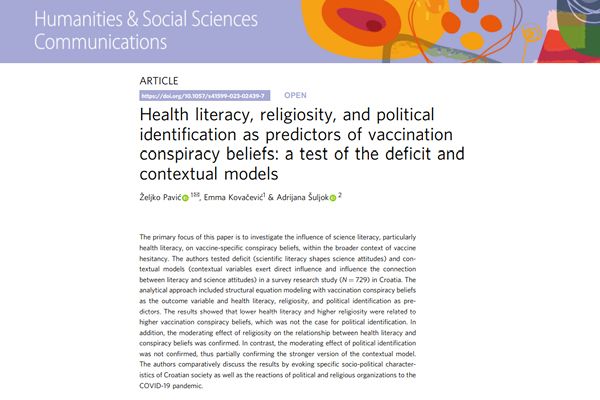Notifications list
Health literacy, religiosity, and political identification as predictors of vaccination conspiracy beliefs: a test of the deficit and contextual models
Published: 11.12.2023.

Prof. Željko Pavić, PhD, Emma Kovačević and Adrijana Šuljok, PhD are the authors of the paper “Health literacy, religiosity, and political identification as predictors of vaccination conspiracy beliefs: a test of the deficit and contextual models”. The paper is published in the journal “Humanities and Social Sciences Communications”, which is indexed in Q1 in WoSCC (2022) for Social Sciences and in Q1 in Scopus (2022) for Arts and Humanities and Social Sciences.
Abstract: The primary focus of this paper is to investigate the influence of science literacy, particularly health literacy, on vaccine-specific conspiracy beliefs, within the broader context of vaccine hesitancy. The authors tested deficit (scientific literacy shapes science attitudes) and contextual models (contextual variables exert direct influence and influence the connection between literacy and science attitudes) in a survey research study (N = 729) in Croatia. The analytical approach included structural equation modeling with vaccination conspiracy beliefs as the outcome variable and health literacy, religiosity, and political identification as predictors. The results showed that lower health literacy and higher religiosity were related to higher vaccination conspiracy beliefs, which was not the case for political identification. In addition, the moderating effect of religiosity on the relationship between health literacy and conspiracy beliefs was confirmed. In contrast, the moderating effect of political identification was not confirmed, thus partially confirming the stronger version of the contextual model. The authors comparatively discuss the results by evoking specific socio-political characteristics of Croatian society as well as the reactions of political and religious organizations to the COVID-19 pandemic.
The paper is available at the link.
